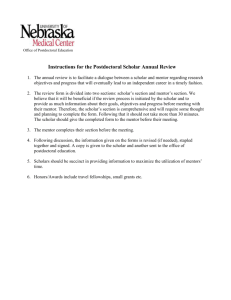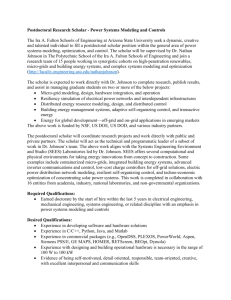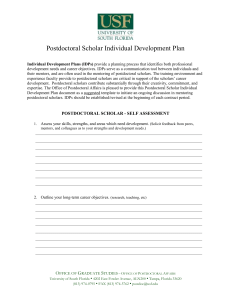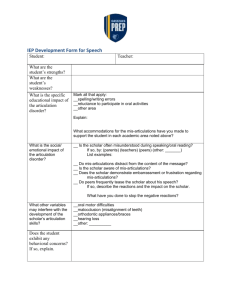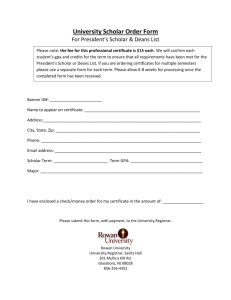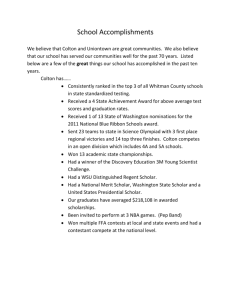Grant Agency Mentoring Plan Template
advertisement
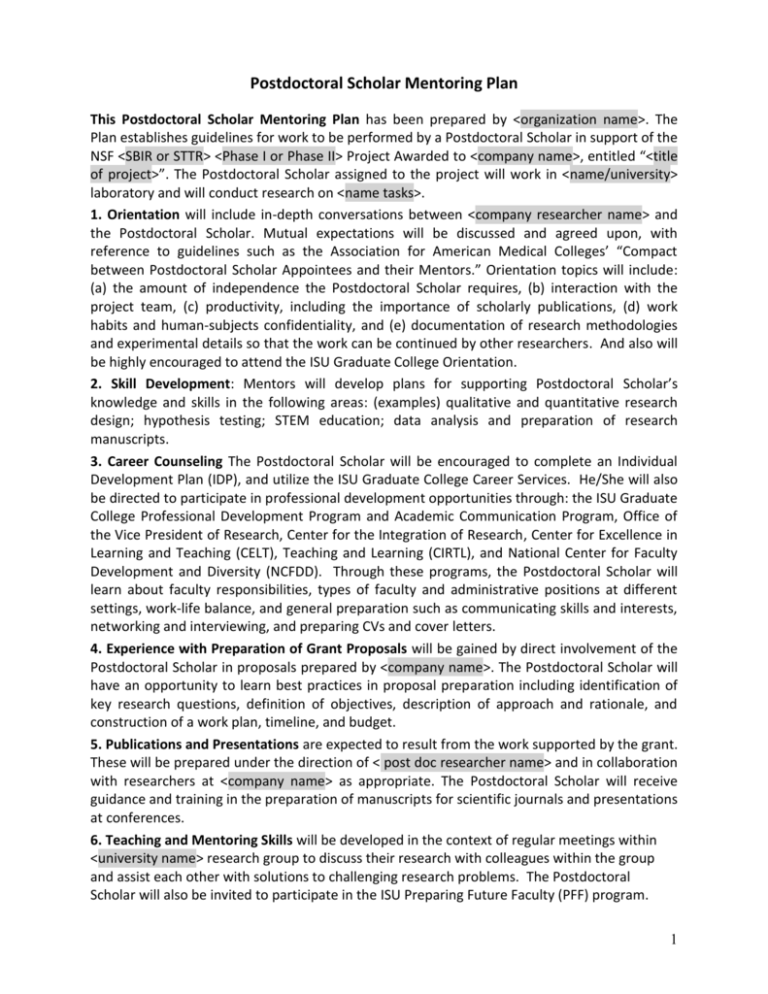
Postdoctoral Scholar Mentoring Plan This Postdoctoral Scholar Mentoring Plan has been prepared by <organization name>. The Plan establishes guidelines for work to be performed by a Postdoctoral Scholar in support of the NSF <SBIR or STTR> <Phase I or Phase II> Project Awarded to <company name>, entitled “<title of project>”. The Postdoctoral Scholar assigned to the project will work in <name/university> laboratory and will conduct research on <name tasks>. 1. Orientation will include in-depth conversations between <company researcher name> and the Postdoctoral Scholar. Mutual expectations will be discussed and agreed upon, with reference to guidelines such as the Association for American Medical Colleges’ “Compact between Postdoctoral Scholar Appointees and their Mentors.” Orientation topics will include: (a) the amount of independence the Postdoctoral Scholar requires, (b) interaction with the project team, (c) productivity, including the importance of scholarly publications, (d) work habits and human-subjects confidentiality, and (e) documentation of research methodologies and experimental details so that the work can be continued by other researchers. And also will be highly encouraged to attend the ISU Graduate College Orientation. 2. Skill Development: Mentors will develop plans for supporting Postdoctoral Scholar’s knowledge and skills in the following areas: (examples) qualitative and quantitative research design; hypothesis testing; STEM education; data analysis and preparation of research manuscripts. 3. Career Counseling The Postdoctoral Scholar will be encouraged to complete an Individual Development Plan (IDP), and utilize the ISU Graduate College Career Services. He/She will also be directed to participate in professional development opportunities through: the ISU Graduate College Professional Development Program and Academic Communication Program, Office of the Vice President of Research, Center for the Integration of Research, Center for Excellence in Learning and Teaching (CELT), Teaching and Learning (CIRTL), and National Center for Faculty Development and Diversity (NCFDD). Through these programs, the Postdoctoral Scholar will learn about faculty responsibilities, types of faculty and administrative positions at different settings, work-life balance, and general preparation such as communicating skills and interests, networking and interviewing, and preparing CVs and cover letters. 4. Experience with Preparation of Grant Proposals will be gained by direct involvement of the Postdoctoral Scholar in proposals prepared by <company name>. The Postdoctoral Scholar will have an opportunity to learn best practices in proposal preparation including identification of key research questions, definition of objectives, description of approach and rationale, and construction of a work plan, timeline, and budget. 5. Publications and Presentations are expected to result from the work supported by the grant. These will be prepared under the direction of < post doc researcher name> and in collaboration with researchers at <company name> as appropriate. The Postdoctoral Scholar will receive guidance and training in the preparation of manuscripts for scientific journals and presentations at conferences. 6. Teaching and Mentoring Skills will be developed in the context of regular meetings within <university name> research group to discuss their research with colleagues within the group and assist each other with solutions to challenging research problems. The Postdoctoral Scholar will also be invited to participate in the ISU Preparing Future Faculty (PFF) program. 1 Through this program, the Postdoctoral Scholar will learn about pedagogy, inclusive design for learning, and effective mentoring. 7. Instruction in Professional Practices will be provided on a regular basis in the context of the research work and will include fundamentals of the scientific method, laboratory safety, and other standards of professional practice. In addition, the Postdoctoral Scholar will be encouraged to affiliate with one or more professional societies in his/her chosen field. 8. Technology Transfer activities will include regular contact with researchers at <company name>. The Postdoctoral Scholar will be given an opportunity to become familiar with the university-industry relationship including applicable confidentiality requirements and preparation of invention disclosure applications. 9. Success of the Mentoring Plan will be assessed by monitoring the personal progress of the Postdoctoral Scholar through a tracking of the Postdoctoral Scholar’s progress toward his/her career goals after finishing the postdoctoral program. 2
